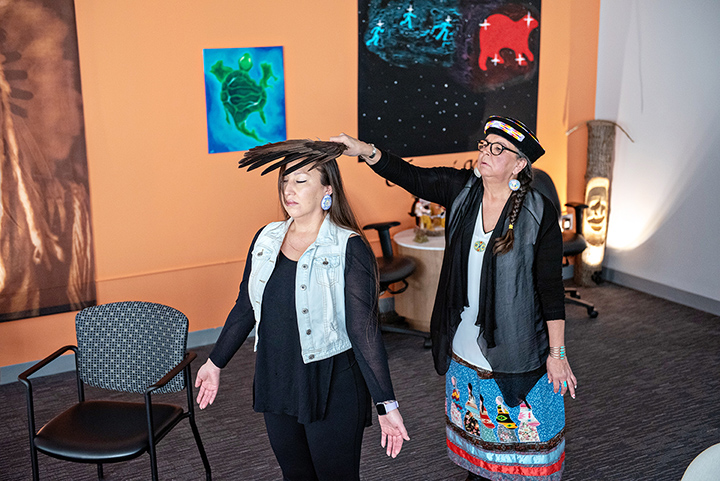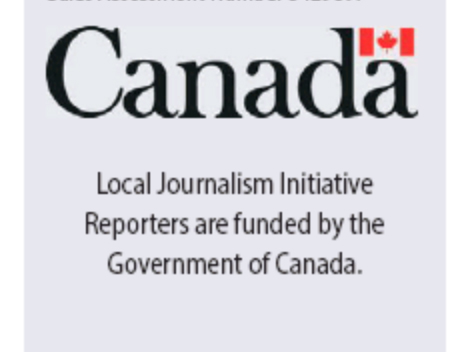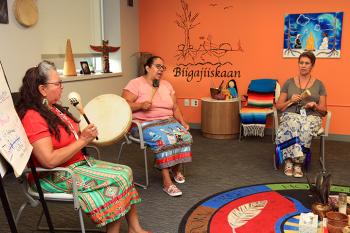Image Caption
Summary
Local Journalism Initiative Reporter
Windspeaker.com

Atlohsa Family Healing Services and St. Joseph’s Health Care London are in the third year of a three-year pilot program to transform mental health services for the Indigenous peoples of the London-Middlesex and St. Thomas-Elgin region of Ontario.
"Biigajiiskaan: Indigenous Pathways to Mental Wellness” has a mandate to deliver a blend of holistic, Indigenous health and wellness practices in tandem with western medical care.
“Historically, our people have had difficulties in any type of western institution that only incorporates western modalities of program or service delivery, and hospitals are certainly one of those institutions where our people have suffered a lot of trauma,” said Raymond Deleary, executive director of Atlohsa Family Healing Services.
Biigajiiskaan attempts to fill in gaps in western health services by offering clients access to knowledge keepers, Elders, and nurses and doctors who are Indigenous.
According to Jodi Younger, vice president of patient care and quality for St. Joseph’s, the Indigenous approach to wellness, which focuses on the mind, body, and heart, is in keeping with the Catholic principles of mind, body, and spirit that St. Joseph’s leans on.
“I think Catholic health has the tradition around understanding that health is beyond what’s in front of us or tangible,” said Younger.
The name Biigajiiskaan is an Ojibway concept that touches on the importance of “all living things working together in harmony for the greater good”, according to the Atlohsa website.
And Deleary says this concept speaks to the intention First Nations leaders had when signing treaties with settlers in Canada.
“We’re embodying the philosophy of the Two Row Wampum, where two nations can exist side-by-side each other in peace without interfering with each other's path,” said Deleary.
While the first year of Biigajiiskaan was focused on building the program and its Indigenous governance circle, years two and three were about transitioning leadership and staffing services to Atlohsa to ensure the program became Indigenous-led.
Clients are able to work with practitioners in a safe and welcoming environment to create individual health care plans for their specific needs, and will have the option to utilize various healing practices from either modality.
The program’s funding comes through the Ministry of Health’s $250 million commitment under “The Journey Together: Ontario’s Commitment to Reconciliation With Indigenous Peoples”, which attempts to address the Truth and Reconciliation Commission’s Calls to Action.
To date, 250 individual clients have been served by Biigajiskaan, housed in the Parkwood Institute of Health operated by St. Joseph’s.
At the end of the funding agreement, Atlohsa and St. Joseph's will present data amassed through the program about accessibility to mental health for Indigenous people.
Deleary recognizes that the ramifications of colonialism, and the intergenerational trauma it has spawned, will prevent some Indigenous clients from participating in this program, but he’s hopeful that today’s impact will create a better tomorrow.
“Perhaps it’s not this generation that’s going to overcome [the effects of colonialism], but it might be the next generation or the next generation after that. All we can do is do our best in our current time.”
“We might not be able to be what everybody needs, but we have opened up a doorway to provide what we can to many more people than we have been able to in the past.”
Younger is enthusiastic about the Biigajiiskaan structural partnership with Atlohsa, saying it has already been a positive opportunity to recognize and address cultural safety.
“This is about recognizing and building awareness around the history and the legacy about why Indigenous people may fear or distrust our hospital system.”
For Younger, the efforts to eradicate systemic barriers for Indigenous peoples, to mental health in particular, can be as simple as addressing the language used to discuss health or within hospital settings.
She views Biigajiiskaan as a concept that will grow, and does not let the language of “pilot program” deter the opportunity for this service delivery model.
“It’s simple things like how to document on a traditional health record an interaction with a knowledge keeper or an Elder or a ceremony. I can tell you our charts don’t accommodate that really well.”

Local Journalism Initiative Reporters are supported by a financial contribution made by the Government of Canada.

